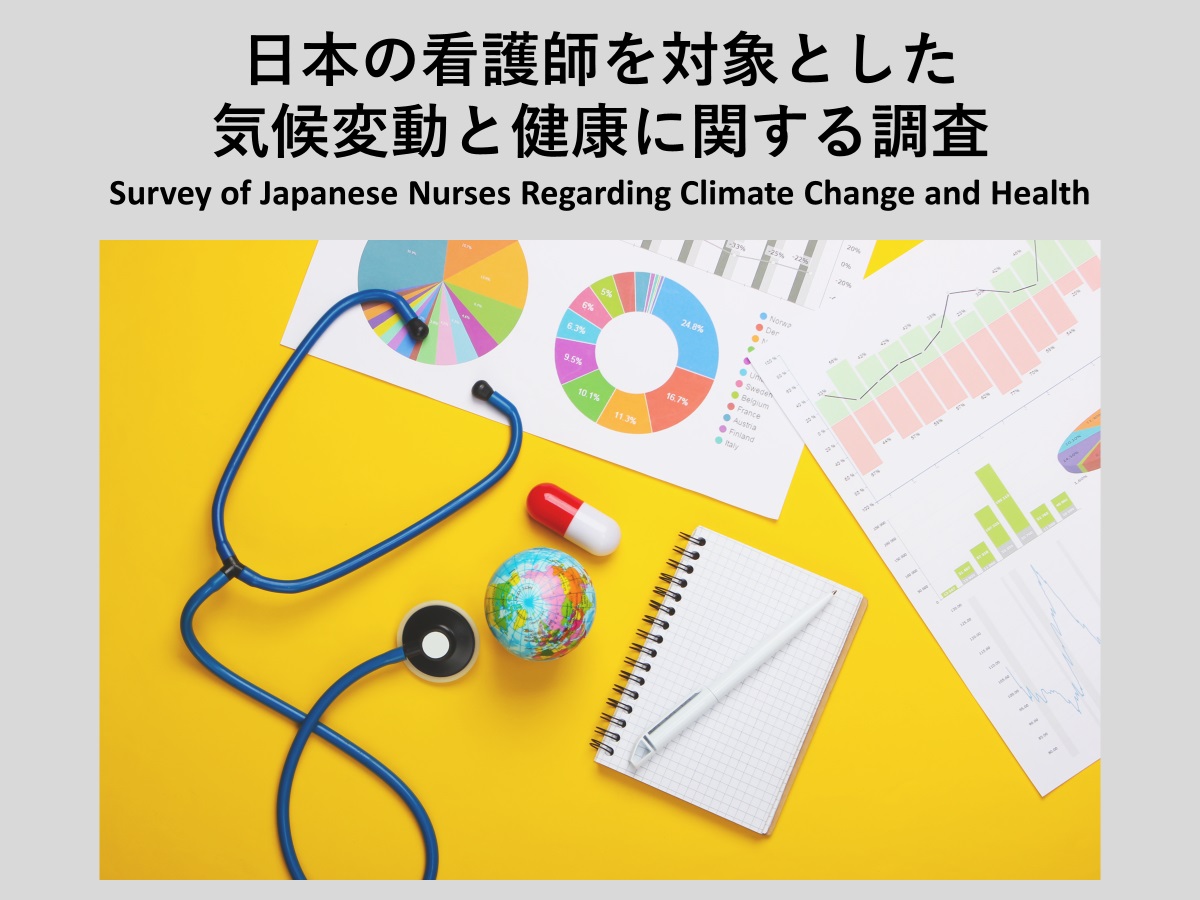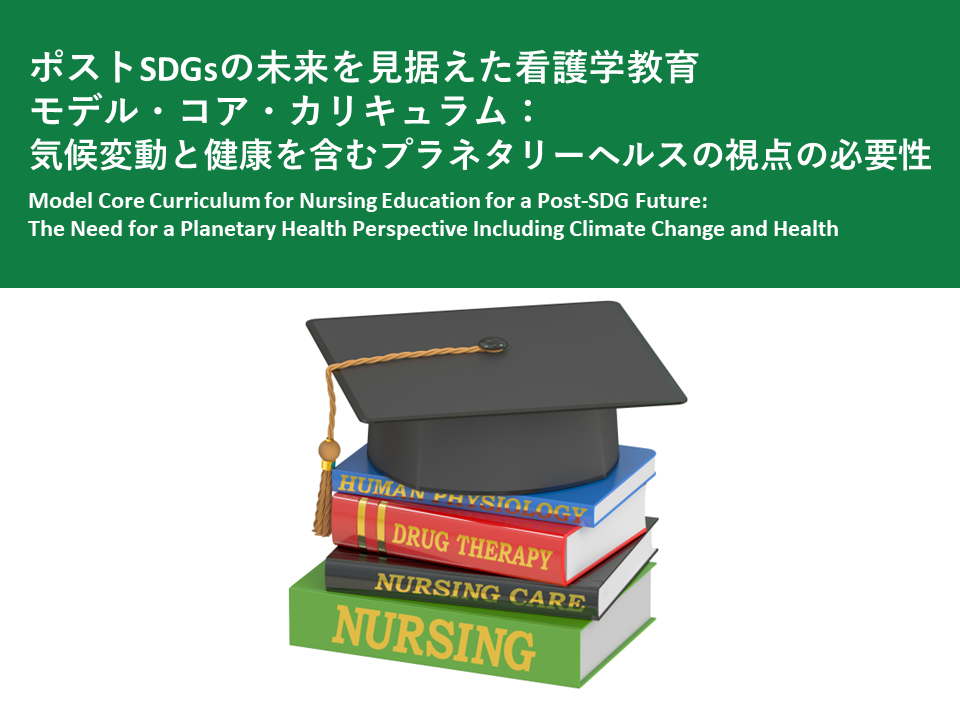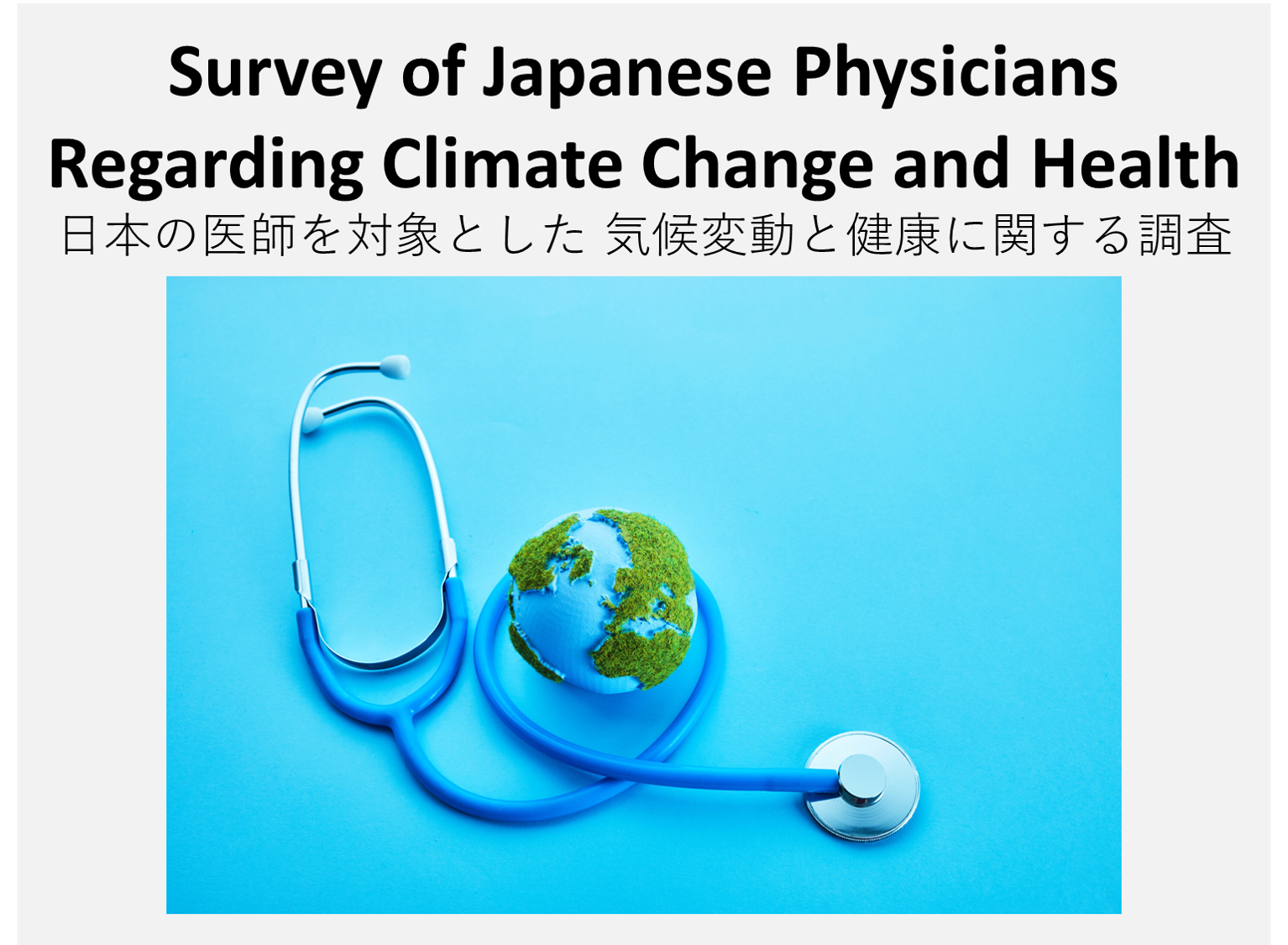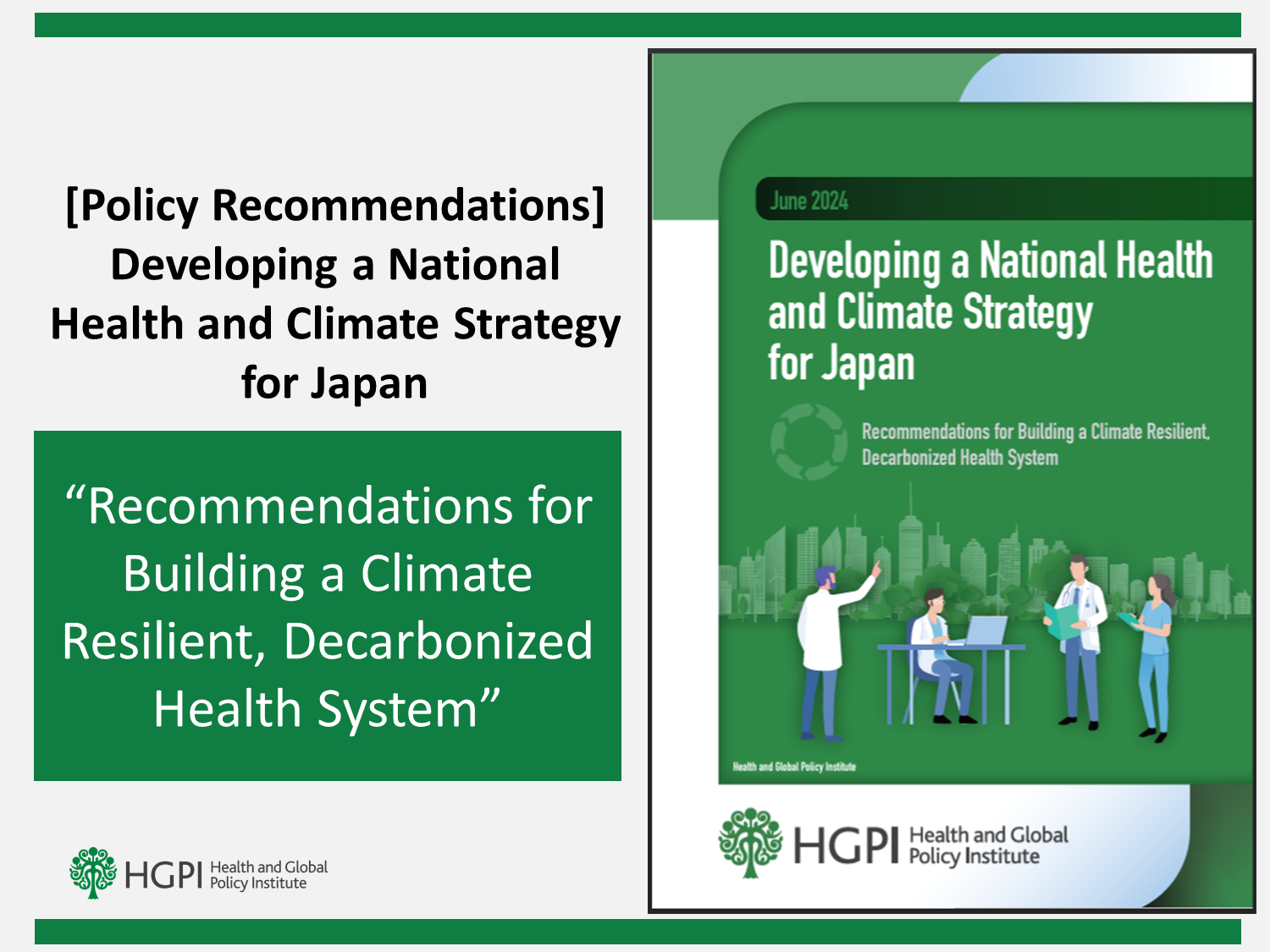[Reserch Report] Survey of Japanese Nursing Professionals Regarding Climate Change and Health (Final Version) (November 14, 2024)
date : 11/14/2024
Tags: Planetary Health
![[Reserch Report] Survey of Japanese Nursing Professionals Regarding Climate Change and Health (Final Version) (November 14, 2024)](https://hgpi.org/en/wp-content/uploads/sites/2/HGPI_20241112_PH_EyeCatch.png)
Health and Global Policy Institute (HGPI) and the Graduate School of Health Sciences at Niigata University have released the final version of the “Survey on Climate Change and Health for Japanese Nurses” (preliminary version released on September 11, 2024) concurrent with the 29th Conference of the Parties (COP29) to the United Nations Framework Convention on Climate Change (UNFCCC).
This survey was conducted to gather opinions on climate change and health, sustainable healthcare systems, and climate change policies. The survey targeted 1,200 nursing professionals working across Japan and was administered through a self-completed online questionnaire. The survey took place from August 28 to August 31, 2024.
*The detailed report in English will be published at a later date.
Key Survey Findings
Willingness to address climate change
- Many nursing professionals (approx. 70%) were aware that climate change is occurring in every region of the world
- Almost all nursing professionals (93%) were aware that Japan is experiencing some forms of extreme weather, and some felt that extreme weather is life-threatening
✔ Among those who responded feeling changes in the frequency and intensity of weather events over the past two to three years, more than half also responded that they have experienced “High temperatures” (96.1%), “Heavy or torrential rains” (86.4%), “Typhoons or storm surges” (74.0%), “Flooding” (71.0%), or “Drought” (62.1%) that “feel abnormal compared to the past”.
✔ In each item, the nursing professionals who responded “clearly abnormal compared to the past, and I feel a threat to life” were as follows: “High temperatures” (30.5%), “Heavy or torrential rains” (18.7%), “Typhoons or storm surges” (14.2%), “Flooding” (13.8%) and “Drought” (8.4%). For “High temperatures,” 7.8 times more respondents selected this response compared to those who responded, “no abnormality compared to the past” (3.9%).
- Among respondents who recognized that extreme weather events are occurring, almost all (94%) responded that these events are caused by climate change
- Among respondents who recognized that extreme weather events are occurring, over three-quarters (75.3%) responded that “if no action is taken, extreme weather events will continue into the next generation”
Knowledge concerning climate change
- Many nursing professionals do not possess accurate knowledge of climate change and its health impacts (respondents who knew all items shared in our survey: 42%*) and the term “planetary health” is not widely recognized (11.2%)
✔ When broken down by qualifications, midwives had the highest correct answer rate (58%) followed by public health nurses (50%), and nurses (40%).
- Very few nursing professionals have opportunities to learn about the health impacts of climate change (13.5%)
✔ Among respondents who were knowledgeable about climate change and health, 33% of those with qualifications as midwives learned information from “Resources provided by academic societies and professional organizations (e.g., articles, scientific conferences, specialized websites).” This was a higher rate compared to those with qualifications in other areas (nurses: 12%, public health nurses: 11%).
✔ Outside of formal education, other top sources of information included the mass media (73.8%), social media (34.5%), and other online media (15.3%).
Professional views on climate change
- Many nursing professionals (72%) view climate change as an important issue
✔ When asked why climate change is an important issue, the most common responses were, “strongly connected to life and the health sector,” “need to address the issue for future generations,” and “health sector also has a negative impact on the environment.”
✔ The top obstacles to taking action on climate change were “I do not know specific methods of addressing the issue,” “there are other duties and issues that must be prioritized,” and “insufficient knowledge about the relationship between climate change and health.”
- Most nursing professionals (80%) feel the need to learn about climate change and health
✔ The most common reasons for the need to learn about climate change and health, “because it is life-threatening, and nursing professionals must know about it,” “nursing professionals should better understand the health sector’s negative environmental impacts,” and “nursing professionals must address the issue for patients and service users today, and for future generations.”
✔ Those serving in hospitals had the lowest response rate regarding the need to learn about climate change and health. By affiliated facility, response rates for those who feel the need to learn about climate change and health were: hospitals, 76%; clinics, 84%; in-home care facilities, 83%; long-term care welfare facilities, 83%; nursing educational institutions, 85%; government agencies, 89%; and other, 90%.
- Most nursing professionals (84%) indicated that they want to learn about climate change and health
✔ The topics that respondents said they wanted to learn about the most were “Health impacts and disease,” “Preparing for extreme weather disasters and other emergencies,” and “Specific methods of implementing climate-friendly practices in routine duties.”
- While only one in five respondents (20%) knew the volume of greenhouse gas (GHG) emissions from the health sector, most nursing professionals (90%) considered GHG emissions to be a problem. More than half (58.4%) responded, “The continued growth of GHG emissions beyond current levels is concerning”
- Many nursing professionals think that if options for providing healthcare services that are less burdensome to the environment are available, these options should be actively adopted (78%), while around half of respondents (49.7%) said they do not know specific methods for doing so
- Initiatives that have been introduced at respondents’ affiliated facilities included waste management (63%), the use of digital technology (45%), energy management (22%), environmentally-friendly facility management (18%), the use of sustainable supply chains (16%), and initiatives for mobility and transportation (16%)
✔ The percentage of respondents that selected “I do not know” about initiatives at their affiliated facilities were 19% for waste management, 27% for the use of digital technology, 36% for energy management, 48% for environmentally-friendly facility management, 50% for the use of sustainable supply chains, and 45% for initiatives for mobility and transportation.
✔ When broken down by position, a higher percentage of those in non-management positions responded “I do not know” compared to those in management positions (for more details, see survey findings.)
✔ When asked about the objectives of such initiatives, respondents selected “To reduce costs” (78%), “To streamline operations” (48%), “To lessen our environmental impact” (35%), “Other” (0.3%), and “I don’t know” (5%).
- Approximately 50% of nursing professionals responded that they can play a role in educating patients and service users about the health impacts of climate change
- Many nursing professionals (approx. 70%) responded that when they are not at work, they provide information, consultation, or support regarding health or healthcare to family members, friends, neighbors, and others close to them
Survey Summary
The survey found that many nursing professionals in Japan are aware of climate change and how it is related to health, but those with accurate knowledge are limited. In addition, many nursing professionals indicated that they recognize climate change as an important issue, that they are willing to learn about the relationship between climate change and health and to work to reduce GHG emissions.
These findings on the awareness, knowledge, and attitudes of nursing professionals in Japan do not diverge significantly from those in other countries and were similar to those of physicians in Japan.
On the other hand, the limited educational opportunities and the lack of organizational initiatives at their affiliated facilities may be factors preventing nursing professionals from learning and being motivated to take action.
Future Expectations Based on Survey Findings
Enhancing Learning Opportunities on Climate Change for Nursing Professionals:
- The number of nursing professionals who possess accurate knowledge is likely to increase if professional associations, academic societies, and other such bodies handle climate change in a manner that is related to their areas of specialty or interest and establish more educational opportunities
Promoting and Expanding the Role of Nursing Professionals in Climate Change Efforts:
- Efforts on climate change can be promoted with less effort and burden by considering the environmentally-friendly practices as an extension of routine duties like waste management, energy management, and the use of digital technology.
- Most nursing professionals serving at healthcare facilities are nurses, so making this group more aware of environmentally-friendly practices is likely to result in changes to both tangible aspects like facility design or systems, as well as to intangible aspects like facility management and work practices.
- Many nursing professionals have opportunities to provide health and medical information, consultation, and support to people close to them, including in their private lives. Ensuring nursing professionals can acquire accurate knowledge regarding climate change and expanding the scope of their duties accordingly is likely to result in them playing key roles in the formulation of climate change adaptation and mitigation measures as advocates and protectors of citizens, or as climate change policy advocates.
Top Research & Recommendations Posts
- [Policy Recommendations] Developing a National Health and Climate Strategy for Japan (June 26, 2024)
- [Research Report] Building a Mental Health Program for Children and Measuring its Effectiveness (June 16, 2022)
- [Research Report] 2019 Survey on Healthcare in Japan
- [Announcement] A Turning Point Towards Building Green Healthcare Systems (June 5, 2024)
- [Research Report] The 2023 Public Opinion Survey on Satisfaction in Healthcare in Japan and Healthcare Applications of Generative AI (January 11, 2024)
- [Policy Recommendations] Obesity Control Promotion Project 2023 “The Next Steps for Engaging and Cooperating with Patients, Citizens, and Communities for Implements of Obesity Control Measurements” (April 8, 2024)
- [New Report] Policy Priorities for Super-Ageing Japan: Health Innovation and Economic Growth in the COVID-19 Pandemic Era (February 24, 2021)
- [Policy Recommendations] Kidney Disease Control Promotion Project 2023 “Establishing Kidney Disease Control Measures with Patient, Citizen, and Community Engagement and Collaboration” Policy Recommendations, a Collection of Good Practices of Chronic Kidney Disease (CKD) and Control Measures in Local Governments (February 14, 2024)
- [Research Report] Survey of Japanese Physicians Regarding Climate Change and Health (December 3, 2023)
- [Report and Recommendations] Discussion Points in Healthcare DX Project Expert Panel Meeting (April 2, 2024)
Featured Posts
-
2024-10-28
[Registration Open] (Hybrid Format) Public Symposium “Promoting CVD Control Based on the Needs of People Living with or Affected by Cardiovascular Diseases: Towards Effective Implementation of the Second Phase CVD Control Plans” (November 22, 2024)
![[Registration Open] (Hybrid Format) Public Symposium “Promoting CVD Control Based on the Needs of People Living with or Affected by Cardiovascular Diseases: Towards Effective Implementation of the Second Phase CVD Control Plans” (November 22, 2024)](https://hgpi.org/en/wp-content/uploads/sites/2/cvd-ncd-20241122-top.png)
-
2024-11-01
[Registration Open] Designing for Dementia Briefing Session 2024 – Conversations on the Trajectory of Our Activities and Envisioning the Future (December 3, 2024)
![[Registration Open] Designing for Dementia Briefing Session 2024 – Conversations on the Trajectory of Our Activities and Envisioning the Future (December 3, 2024)](https://hgpi.org/en/wp-content/uploads/sites/2/dementia-20241203-top.png)
-
2024-11-11
[Discussion Points] Women’s Health Project Expert Meeting “The Ideal System for Perinatal Medical Care in Japan in the Era of Declining Birth Rates” (November 11, 2024)
![[Discussion Points] Women’s Health Project Expert Meeting “The Ideal System for Perinatal Medical Care in Japan in the Era of Declining Birth Rates” (November 11, 2024)](https://hgpi.org/en/wp-content/uploads/sites/2/wh-20241111-top_ENG.png)
-
2024-11-11
[Registration Open] (Hybrid Format) Obesity Control Promotion Project Public Symposium “Obesity Control as a Social Issue; Toward the Realization of Citizen-Centered Policies” (December 4, 2024)
![[Registration Open] (Hybrid Format) Obesity Control Promotion Project Public Symposium “Obesity Control as a Social Issue; Toward the Realization of Citizen-Centered Policies” (December 4, 2024)](https://hgpi.org/en/wp-content/uploads/sites/2/HGPI_20241107_FY2024ObesitySymposium_eyecatch.jpg)
-
2024-11-14
[Reserch Report] Survey of Japanese Nursing Professionals Regarding Climate Change and Health (Final Version) (November 14, 2024)
![[Reserch Report] Survey of Japanese Nursing Professionals Regarding Climate Change and Health (Final Version) (November 14, 2024)](https://hgpi.org/en/wp-content/uploads/sites/2/HGPI_20241112_PH_EyeCatch.png)








